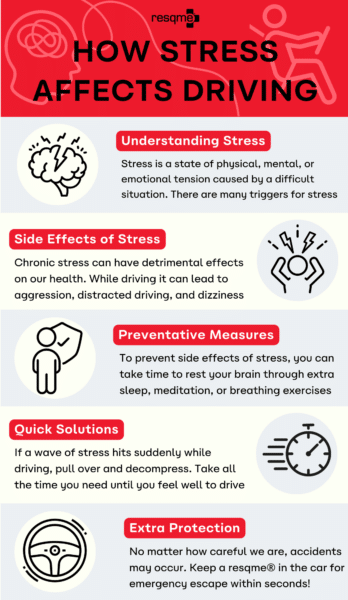As we all know, many factors can affect our ability to drive carefully and focus on the road. Stress is one very important factor we must consider before getting behind the wheel and hitting the road.
Understanding Stress
First of all, it’s crucial to be able to discern when you are stressed. In the simplest terms, stress is a state of physical, mental or emotional tension caused by a difficult situation. There can be many triggers that cause stress, but paying attention to your emotions and reactions to different circumstances can really help.
Side Effects of Stress
Unfortunately, one of the side effects of stress, specifically chronic stress, is the inability to focus, and potentially imbalance brain structure. Over time, stress can impact decision making and internal communication systems.
While driving, these simple disruptions/changes in bodily function can be detrimental. Stress is strongly linked to increased aggression, which can result in speeding, sudden changes in direction, and road rage. Even more simply, stress can lead to common cases of distracted driving, in which attention is focused on something other than the road & act of driving. Finally, stress can impact your physical wellbeing in the moment, including dizziness or overwhelming light-headedness. This combination of unsafe driving habits can put yourself and others in danger.
Preventative Measures
Luckily, there are steps we can take to limit stress and mitigate its effects as they become more prominent. If you feel yourself being drained by work, school, family, or other responsibilities, take a moment to assess your involvement/activities. Consider cutting back on extremely time consuming tasks, and allow yourself time to rejuvenate and unwind. Similarly, once you feel your stress increasing, carve out extra time to rest your brain, whether it be through meditation, taking a break, or sleeping more. Another method of reducing stress includes creating schedules to organize your responsibilities & time. This simple action makes each task on your list more manageable and easily accounted for. Finally, taking time away from screens and technology can help you unplug and wind down, giving your nervous system time to reset.
Quick Solutions
Sometimes, stress strikes quickly, and there is nothing we can do in advance to reduce its adverse effects. If a sudden feeling of stress takes over while driving, safely pull over and focus on your breathing. Take a few minutes to nap/meditate to clear your mind and ease your tension. If others are in the car with you, ask them to take over driving to avoid any dangerous situations.
Extra Protection
Remember that it is only safe to drive when your full attention is dedicated to driving and your surroundings. Sadly, not all people follow this rule, so regardless of how careful or stress-free you are, other’s driving habits may put you in danger. To protect yourself, store a resqme® in your vehicle at all times, in case you need to escape or help others to safety in an emergency. You never know when it might come in handy, and having some extra protection can also ease your mind about driving!



